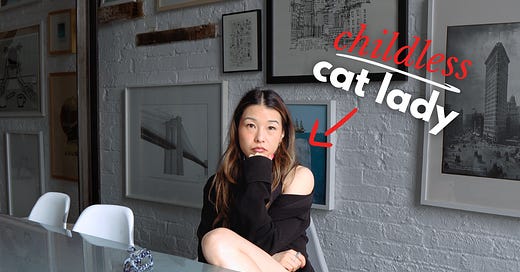“It’s like a cattle call.” That’s how my friend described the Upper East Side location of Weill Cornell’s Center for Reproductive Medicine (CRM). The waiting room—well over four times the size of my entire apartment—was tetrised with an array of chairs and sofas, dotted with some men, mostly women. No one looked upset, but no one looked happy, either. A word came to mind: pious.
The nurses would come out into the waiting room and yell a series of first names. Sarah! Ji-young! Louise!1 before four women would stand up, gathering their bags and light jackets. Even though it was well into May, the persistent rain reminded me of April. Climate change spun calendar months around the wheel of anticipated weather like I’d once spun the combination lock on my high school locker. January was now December, weather-wise; all the other months shifted accordingly. My sense of ones were now zeroes.
As the four women clopped towards the nurse, the nurse checked her sheet of paper. Sarah O’Connell, she clarified. The other Sarah turned on her heels, walked back to her pen, dropped into her seat again to wait.
When I went to get my blood drawn for monitoring, the nurse told me they once had two women with the same exact name undergoing stimulation—the hormone injections intended to stimulate one’s ovaries to grow eggs—at the same time. What were the chances?
In Manhattan, one of the counties with the oldest average first-time mothers—32.9 for college-educated women in 2016—the chances are higher than you’d think. (New York ranked first in the country for the number of women aged 40-44 having their first child.) Advancements in alternative reproductive technologies have transformed the previously near-impossible into merely difficult (and expensive).
Friends have described their own desires to procreate as primal, visceral. I always thought this thing called a biological clock existed within me too, ticking, tocking, readying its alarm. But as I advanced in my career, earned more money, and cohabited with a long-term partner, the biological clock never went off. The alarm was instead me. I didn’t feel better prepared for children; instead, I became petrified that I would no longer have an excuse to not have children.
In her book Why Have Children?: The Ethical Debate, the philosopher Christine Overall takes issue with the traditional viewpoint that procreation is “natural.” It is backwards, she argues, to ask people why they don’t have children—instead, we should be asking those who choose to have children for “more careful justification and reasoning” of their decision.
To Overall, procreation is a moral question. How could it not be? When multiple governments are trying to increase birth rates through baby bonuses, exemption from mandatory military service, and plain ol’ PR, you know babies aren’t a matter of personal choice anymore (if they ever were). Effortful governmental policies signal collective concerns; politicians wouldn’t burden themselves with mere individual questions.2
The moral good of procreation can also be seen in how much parents long for grandchildren from their kids. My mother—a pretty conservative woman, mind you—told me in my late twenties that she didn’t care if I had a child out of wedlock. She wanted a grandchild that badly. This coming from the woman whom I got into screaming matches with in high school because I wanted to go on dates.
I have always been suspicious of procreation because of, first, my contrarian nature, and second, what I’ve observed as baby exceptionalism. We are generally advised to think things through before acting. Conduct our due diligence, prepare for all outcomes. Except when it comes to having children, we are supposed to be guided more by heart than logic.
What accounts for this baby exceptionalism? It is the one area of life that society treats as an endless moral good. If I applied to Princeton ten times and were rejected ten times, people would undoubtedly ridicule me from afar. Those close to me would eventually hint that I should give up. Some paths just aren’t meant for everyone.
But having a child? A child is good. Going to great lengths to have a child is acceptable—even lauded, an advance demonstration of how far you’d go for the child once born. We would never, ever in a million years think about telling someone dealing with infertility that maybe they should give up, some paths aren’t meant for everyone. It’s abhorrent to our social mores.
Why is that? Why is it more appropriate to ridicule someone for striving in their career than striving to become a parent?3 Why did Roxie Hart’s fake pregnancy in Chicago succeed in garnering her attention and sympathy? Whenever I contemplate these instances of baby exceptionalism, I wonder if everyone else can see something I can’t, like in autostereograms, those 2D optical illusions which reveal a 3D scene when viewed the right way:

It would make sense if that were the case. My mother was always excellent at autostereograms. I could never get them to work.
Despite baby exceptionalism, there is growing consensus around societally acceptable arguments to not have kids. Chief among them: climate change. Professor Heather Houser calls this the “reproduction-climate nexus.” The idea is that “ending human reproduction is the kindest thing for the planet,” in light of the fact that a child’s greenhouse gas emissions will cause “roughly fifty square meters of sea ice to melt every year they are alive.” A child’s birth and life goes hand-in-hand with Earth’s destruction.
But it’s not just the climate. While I do care about the reproduction-climate nexus, I admit my fears around children also slant more quotidian, more selfish. I worry that by having children, I will lose myself.
I have already seen it in friends. How they shoulder more of the physical labor of child-rearing—some parts necessarily, as when it comes to pregnancy or breastfeeding; but other parts unnecessarily, such as cleaning or ferrying to the pediatrician or simply the mental load of 24/7 observation. Meanwhile, their husbands can clock in, clock out. Even when they meaningfully participate in childcare, the division of domestic labor will never be equal.
I experienced a version of this during the embryo freezing process. Though the embryos would be products of two, the labor fell disproportionately on one: me. I was the one who went to the monitoring appointments every other day at first, and then daily. I was the one getting stabbed with needles. I was the one prohibited from working out. I was the one waking before 6am for the pre-op appointment. N was very helpful—he mixed the medications, administered the shots—but at the end of the day, he was himself, helping out. I was the one who became a shell of myself, quite literally. During those weeks, I was a vessel for eggs, unable to engage in the small joys which formed a large portion of my life satisfaction.
As with the biological clock, I kept on waiting for the hormones to transform me. Was I not supposed to get more emotional? Where was my attachment to these eggs, these first component parts of human life? Instead, I felt nothing but resentment and frustration—and then shame. Because I knew how much of a privilege it was to be able to access alternative reproductive technologies like IVF; and here I was, once again unable to enjoy a privilege.
I don’t know what’s worse: losing myself and resenting it the whole time; or losing myself and embracing that loss. Part of me wishes the hormones had somehow transformed me. Acceptance through physiologically-induced self-delusion is still acceptance, after all. But another part of me is terrified at the prospect of seeing the baby in the autostereogram. What if I become okay with bookmarking my own dreams and ambitions because of baby exceptionalism? What if I am not only co-opted by the system but willingly leave with my captors?
Professor Laurie Ann Paul, a professor of philosophy and cognitive science, calls this decision-making in the face of overwhelming doubt and uncertainty operating from an impoverished epistemic position. You cannot know ahead of time how seeing and touching your newborn child will transform you, imbue you with new knowledge. You can only learn the full extent by doing. This is true of many other experiences, too, but few other life events are non-refundable in quite the same way. I can drop out of college; quit any job; divorce my spouse. I can’t return my baby.
But what if all this hand-wringing about the baby question is a symptom of late-stage capitalism? My overthinking is the consequence of our government and corporations pushing for individual responsibility while they continue profiting from collective harm.
It was actually the fossil-fuel company British Petroleum (BP) that first introduced the idea of the carbon footprint to the public in a 2005 ad campaign. By sneaking personal climate anxiety into the general consciousness, BP could distract us on an individual level—leaving us to calculate emissions from our vacations, harms from each iced coffee cup, glacier melt from each child—while causing climate deterioration beyond our wildest imaginations. BP gave us eco-friendly rope to endlessly fret over, to hang ourselves with—all while they dodged responsibility for oil spills and lobbied the U.S. government for less regulation and more methane, more carbon.
It turns out the concept of the carbon footprint was the perfect Trojan Horse for BP’s continued multi-billions in profits. I calculated that if I don’t have a child, I’ll save 34 tons of carbon emissions over their nonexistent lifetime. All while BP pumps out 32.2 million tons of greenhouse gas emissions. A year.
There is something profoundly twisted about feeling guilty about having kids because of a concept that BP introduced into the world. There is something fucked up about avoiding a life event because our government doesn’t provide the liberties and safety nets I pay over 40% of my income in taxes for. Our politicians and corporations have continually fed us reasons to despair; I have eaten them, stem, seeds, and all. And then I blame myself for my despair. Wonder if I’ll despair less if I hustle grind harder, contribute less to carbon emissions, avoid bringing another life into this world of despair, end my life altogether. I don’t realize that my guilt obscures the only way out of this despair: hope through collectivity. Which yes, can include children, because of course the collective includes children.
I don’t find myself agreeing with J.D. Vance often, but he did say something I found quite touching at the March for Life (yes, that March for Life—the anti-abortion one, ugh). He said:
I want more happy children in our country, and I want beautiful young men and women who are eager to welcome them into the world and eager to raise them. And it is the task of our government to make it easier for young moms and dads to afford to have kids, to bring them into the world and to welcome them as the blessings that we know they are.
We need a culture that celebrates life at all stages, one that recognizes and truly believes that the benchmark of national success is not our GDP number or our stock market but whether people feel that they can raise thriving and healthy families in our country.
Putting aside the venue of this speech, what Vance says is a lovely sentiment. I would like to live in a country where the benchmark of success isn’t GDP or the stock market but whether people feel they can raise thriving and healthy families. Now, do I think the GOP actually has policies advancing that goal? No. But I do think it’s a beautiful vision, and I envy the conviction of both pro- and anti-natalists. The pro-natalists truly do believe the world can be a beautiful place full of children and laughter; the anti-natalists similarly believe this polluted world can become lush and cerulean and vibrant once again. I want their optimism, their hope, their faith. That fever in their eyes when they cross from an impoverished epistemic position to a verdant one.
In the waiting room at CRM, I glimpsed it. In Conclave, a Cardinal who is tasked with selecting the new Pope says:
Our faith is a living thing precisely because it walks hand-in-hand with doubt. If there was only certainty and no doubt, there would be no mystery. And therefore no need for faith. Let us pray that God will grant us a Pope who doubts.
In the same way, should we not pray for both parents and child-free people who doubt? The very existence of strong pro- and anti-natalists surely proves that there is much mystery in this life, and therefore the necessity of faith. Our faith in humanity—or the end of humanity—as a good must walk hand-in-hand with doubt.
For a split second, sitting there in the waiting room holding my thin plastic cup of water—berating myself for using single-use plastic yet again—I felt sixteen again. Taking communion for the first time. Except this time, I was the one spilling blood, offering vials of blood every day in case I wake one day and find my faith again.
From my northwest: “Cece! Juliana! Tori!”
I was seated far enough from the nurse that by the time I traversed the chairs and sofas and tables, the nurse was already gone. Juliana and Tori were closer, or quicker, than I.
Nevertheless, I kept standing in the corridor. Waiting. Hoping. Praying. ◆
Thank you for reading debrief! If you enjoyed this post, consider upgrading your subscription or sharing this post:
Becoming a paid subscriber gives you access to my inner sanctum—essays and private podcast episodes on nascent ideas—as well as archival posts older than six months. Subscribing also helps ensure that my informational and educational video content on all other platforms remains freely available to all.
Please know, though, that having you here and being able to be in conversation with you is the most important thing to me. If you are a student without disposable income, un-or under-employed, or a minimum-wage worker, just email me or fill out this form and I’ll comp you a free subscription, no questions asked. If you’d like to donate one of these subscriptions, you can do so here.
All names are changed. Duh.
This is also the primary tension in the abortion debate. Is abortion a personal choice or a collective harm?
Just to be clear, I don’t think we should ridicule anyone for striving towards anything—career, parenthood, or hobby.

















Share this post